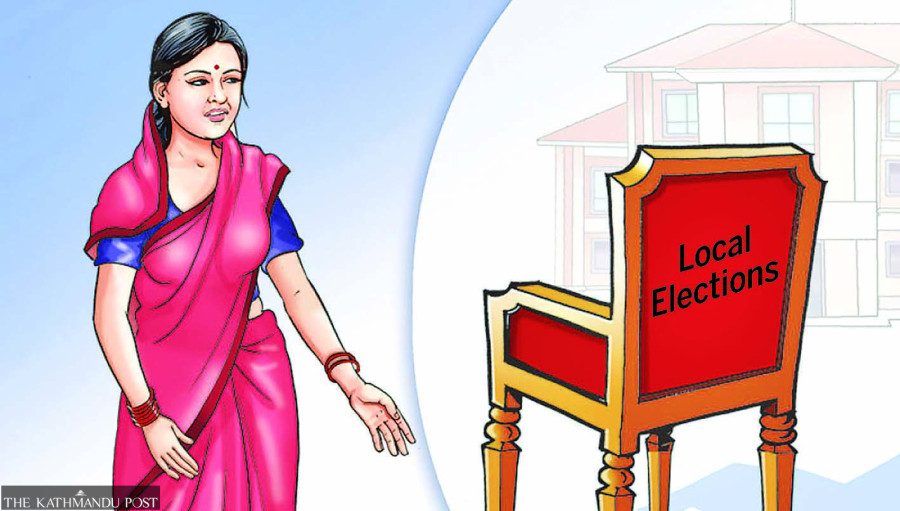National
Women leaders from across the political spectrum say they feel constrained
Their representation in local elections has been trimmed but they cannot speak up. Female politicians say the fight will continue though.
Aakriti Ghimire
Out of 46,693 nominations for executive positions at the local level —mayor, deputy mayor, chairpersons and vice-chairpersons and ward chairpersons—only 4,851 are women.
While women’s nomination makes up a total of 37.84 percent, only 8.4 percent of the candidates are for executive positions, according to the Election Commission.
The remaining nominations—for female ward member and Dalit female ward member—are mandated by law.
Nepal is holding local level elections on May 13, and given the number of nominations of women, their representation will be hugely reduced compared to the 2017 elections.
“This severely undermines female politicians’ capacity, contribution and eligibility,” said Binda Pandey, Standing Committee Member of the CPN-UML. “It shows that female politicians haven’t been accepted by political parties at all.”
While fielding female candidates is mandated by law, political parties have exploited a legal loophole to thwart women’s representation in local governments. The discimination against women within the parties and female politicians’ inability to speak up against their parties have largely limited their ability to protest such decisions, according to women leaders.
“The parties have manipulated the essence of the constitution to suit their interests,” said Uma Thapa Magar, deputy mayor of Nepalgunj Sub-metropolitan City, who did not get a mayoral ticket from her party Nepali Congress despite her wish.
As per an understanding among the five-party electoral alliance, the mayoral ticket was given to Prashant Bista of the Nepali Congress and the ticket for deputy mayor to Kamaruddin Rai of the Janata Samajbadi Party.
“A man who was previously a ward chair is given the ticket for mayor but a female deputy mayor who has looked over the tasks of the entire municipality is sidelined. Why?” said Magar, lamenting that discrimination against women within political parties is rampant.
Female politicians admit that they cannot speak out against the leadership within their own parties and their values, all the while holding their flags. Such limitations force them to self-censor and are unable to push back within the party.
“I can’t speak against my party. And as much as we disagree with the party’s actions, we can’t speak out openly,” said Magar. “Women in the Central Working Committee also haven’t spoken up. How will we, or how can we?”
According to Magar, the alternative to party politics is independent candidacy, but the public’s refusal to support independent candidates forces them to navigate the limited rights they exercise at the mercy of party leaders, mostly men.
Despite female politicians’ and lawmakers’ attempts to draw the attention of the relevant authorities, lack of timely attention from the judiciary, and sheer neglect by political party leaders, female nominations have gone down compared to last local elections.
Exploiting a loophole in Section 14(4) of the Local Level Election Act 2017, alliance-politics has trimmed women’s local representation, as predicted by political and election analysts.
Women’s candidacy is lower than women’s share of victory in the 2017 local elections, which will most likely result in further lower female representation in local governance after the 2022 local elections.
With parties pursuing alliance politics, female politicians feel cheated. They realise that female empowerment is insufficient until male political leaders perpetuate the same sexist mindset.
“Women, Dalit members, or individuals from marginalised communities may be as empowered as ever. But progressive political change seems to be impossible until the mindset of the male leadership doesn’t change,” said Pandey of the UML.
The lack of female representation is the evidence of how sidelining women continues in contemporary politics. Many women politicians feel extremely discouraged by the parties’ lack of support in their political careers despite their exceptional contribution. However, the decline in nominations hasn’t deterred female leaders who see the only way for a better redressal of women’s issues locally and the formation of a more equitable and just society is through inclusive female representation.
Many are even more adamant and determined to ensure that their representation will not be curtailed. Be it by demanding votes for women or ensuring the law itself gets amended, female politicians seek a larger alliance to ensure women’s representation at executive tables.
“Until you have a law that mandates women’s candidacy, we will not be represented. It has been made very clear with alliance politics in elections,” said Rekha Sharma, central leader and whip of the CPN (Maoist Centre).
This is a lesson female politicians have learnt and plan on moving ahead accordingly.
Pandey, who is also a lawmaker, believes two immediate actions are imperative to nullify the deliberate exclusion of women in the local election by the parties. Firstly, she says, the Election Commission should mandate one vote for a woman under the mayor or deputy mayor position.
“Parties may have refused to nominate women, but now it is important to start a campaign to ensure at least one vote for women—either the mayor or deputy mayor,” she said.
Secondly, female politicians are preparing themselves to push for the amendment of laws before the federal and provincial elections, having learnt the ways of the male leaders.
“We will immediately push for the amendment of laws before the federal and provincial elections in November. And we will now ensure that there is at least 50 percent female representation at those levels,” Pandey told the Post.
Given the limitations within which women leaders can speak out against their parties, Magar from Nepalgunj believes that forces outside political parties must also speak up for them. Third-party lobbying is crucial for a greater inclusive Nepali politics, she said.
“We need a larger alliance beyond the political parties,” Magar told the Post from Nepalgunj over the phone. “Despite lobbying within the party, there’s no hope. We need external pressures, from individuals and organisations to speak up against this, because we can’t.”
This alliance shouldn’t be limited to women, but should also ensure men’s involvement, according to her.
“Without the involvement of men who are allies, this fight will continue to remain unheard and ignored,” she said. “Having worked in the Nepali political system for long, somehow there’s more value in what the men have to say. If we are to make men hear, we need a larger alliance that also has men speaking for us.”
Many women in politics are unwavering in their determination to prevent the collective efforts of men denying political rights to women. Recognising the need for a legal mandate, they plan on starting with the amendment of the law.
“It is very evident that men and women are unequal in politics. Perhaps, if not for the alliance politics this wouldn’t have happened. But it did,” said Sharma. “We need the law to ensure our representation.”




 11.12°C Kathmandu
11.12°C Kathmandu














